---------------------------------------------------------
Lately I have been researching the benefits of fermented chicken feed- there is so much to know! Get the basics answered with The Hows & Whys of Fermented Chicken Feed
What is fermented food and why should you add it to your chicken’s (or your) diet?
Fermentation is the chemical breakdown of food by natural bacteria, yeast, or microorganisms. They feed on the sugars and starch in the food. Some foods that are typically fermented include beer, pickles, bread, cheese, yogurt, sauerkraut and so many more.
Fermenting helps preserve food and adds beneficial enzymes, vitamins B, C, and K, folic acid, and various strains of probiotics. Because fermented foods have already been partially broken down, they are easily digestible & helpful for absorbing nutrients. Fermented foods & drinks add beneficial bacteria to your digestive system. This helps aid in nutrient absorption, not just in the fermented food you are eating, but all the food you eat as the good bacteria lingers in your gut.
All those vitamins & nutrients can help keep us (and our chickens) healthier and ward off diseases. It can boost intestinal health by forming a barrier to pathogens like E. coli and Salmonella.
Best of all fermenting chicken feed is super inexpensive and can help stretch your feed budget. There will be less wasted feed. With dry feed, chickens tend to scratch it around and make a big mess. With a fermented mash, they will gobble up every bit! With enhanced digestion, your hens will stay fuller longer, meaning they will eat less, again saving you money. In your laying hens you will notice a larger, tastier yolk, stronger shells & an all-around healthier flock. Sold yet? Let me give you one final reason – it is ridiculously easy!
How do you ferment chicken food?
Fermenting chicken feed requires just a few things – a large jar with a lid, filtered water, chicken feed (you can use crumbles, pellets, or even scratch), and time.
Choosing the right container
First, you have to decide how much feed you are going to want to have fermenting so you can choose the appropriate size container. If you want this to be their only source of feed, you will want to plan on about 1/2 cup per chicken per day.
Good container choices are large Mason jars or a big 5-gallon bucket if you have a large flock, but you could use any plastic or glass jar with a lid. Avoid using a metal container as the high acid of the fermented feed can interact with the metal and contaminate your feed.
I only feed them fermented feed as an occasional treat so I just use a large mason jar. Do what you can with the space you have. If you have a nice warm (at least room temperature) spot where you can keep several jars or buckets you can get a great fermentation rotation going where you have lots of jars in various states of fermentation so your flock can exclusively eat fermented feed.
Getting started
Add your feed to a clean jar, only fill it about one-third to one-half full to allow room for the feed to expand. I often make the mistake of filling the jar too much. Don’t panic if it starts to overexpand. Just scoop some out and feed it to the flock early.
Add water so that it covers all the feed plus a couple of inches. You will find on the first day you will have to add water throughout the day (and possibly scoop out some feed if it expands too much). As the feed soaks up the water, the water line will get lower and it is important that all the feed stays submerged so bad bacteria and mold will not grow. It’s best to not use tap water as most towns add chlorine to prevent bacteria growth (both good & bad). You don’t want to use something that will kill the good bacteria.
Add the lid and let it sit
Put the lid on and let it sit in a room temperature place for 3-4 days. Once or twice a day open the jar up to off-gas it and give it a stir. Add water if needed to be sure the feed stays submerged. You can feed your flock the fermented feed at any point, but the beneficial nutrients will peak around day 3 or 4.
How do I know if the fermented feed has gone bad?
Properly fermented feed will be bubbly and smell tangy and slightly sour (similar to yogurt). It should NOT smell rotten. Fermented feed that smells rotten has bad bacteria or possibly mold growing in it. If you made sure to keep the feed totally submerged and have not had it soaking for more than 4-5 days it is pretty unlikely your feed will have gone bad.
Feeding your flock
Scoop out the fermented feed and put it in a shallow dish for the chickens and watch them go crazy! In the winter, pop the fermented mash into the microwave for a warm treat (be sure to thoroughly stir and test the temperature before feeding.)

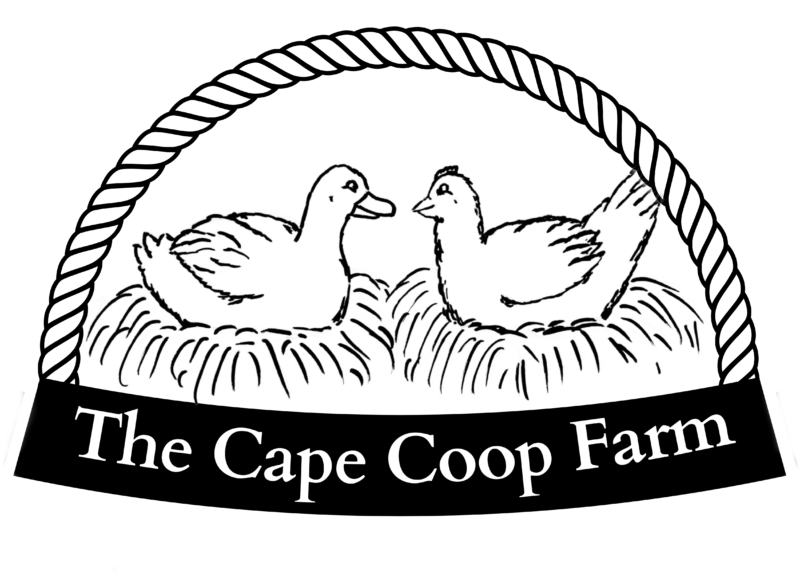
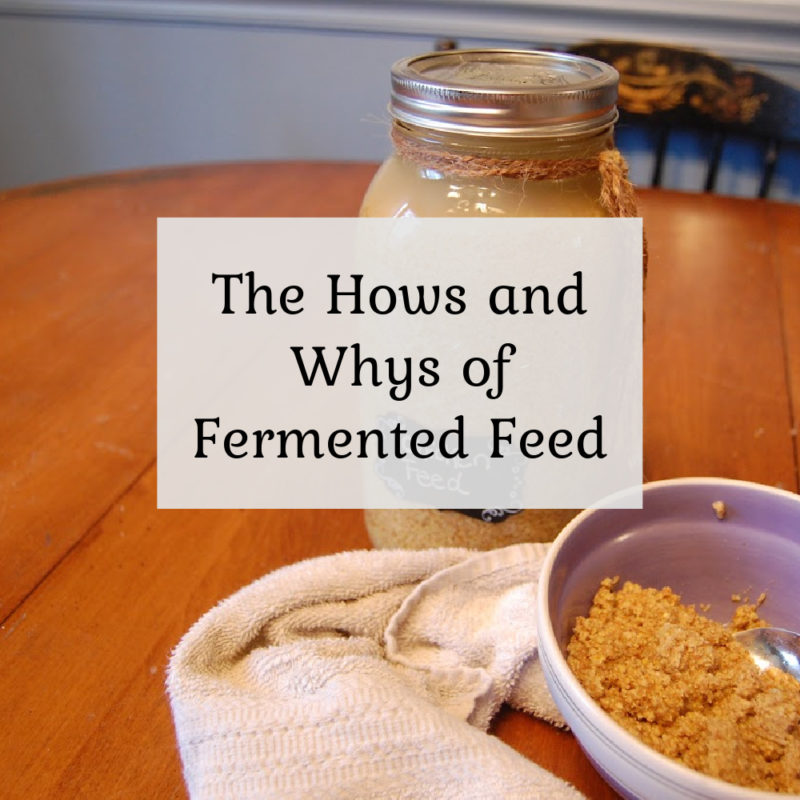

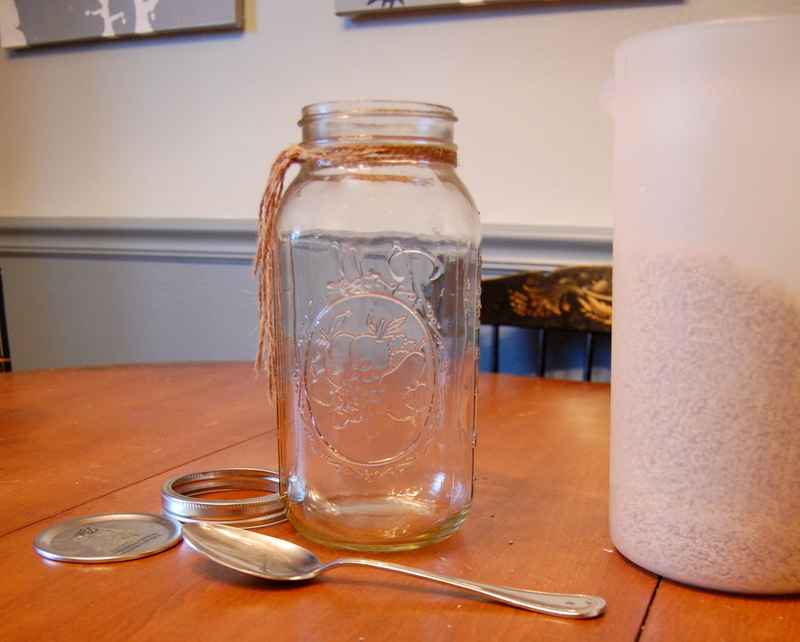
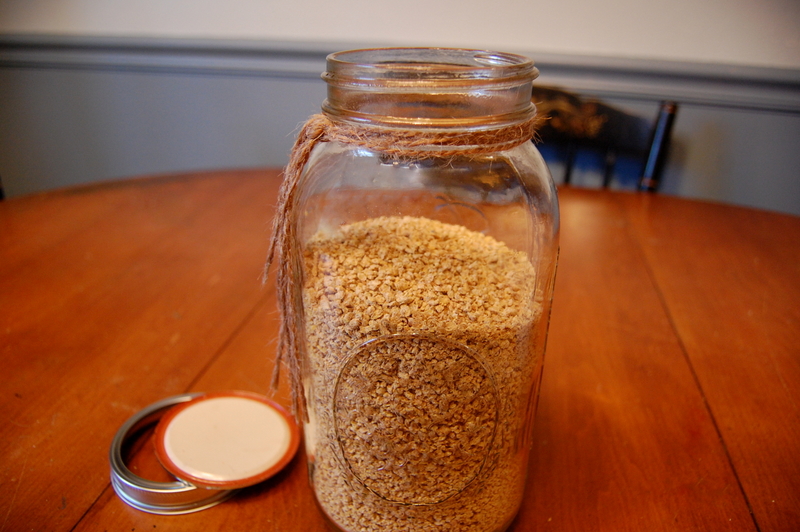
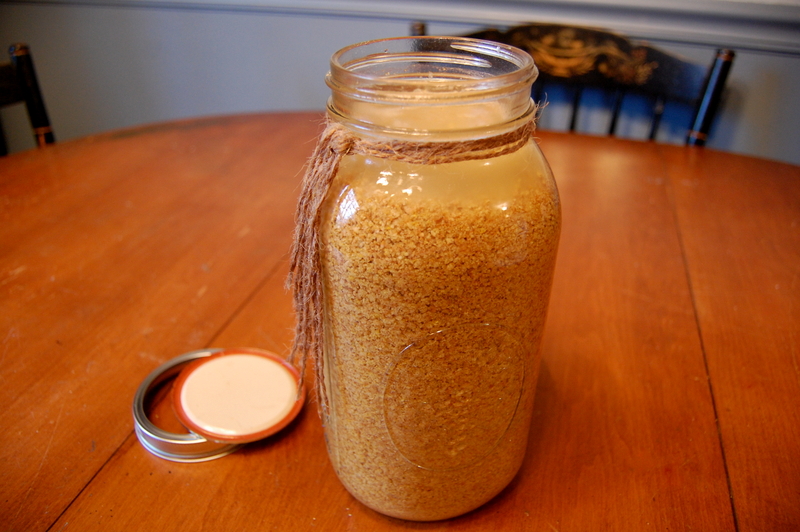
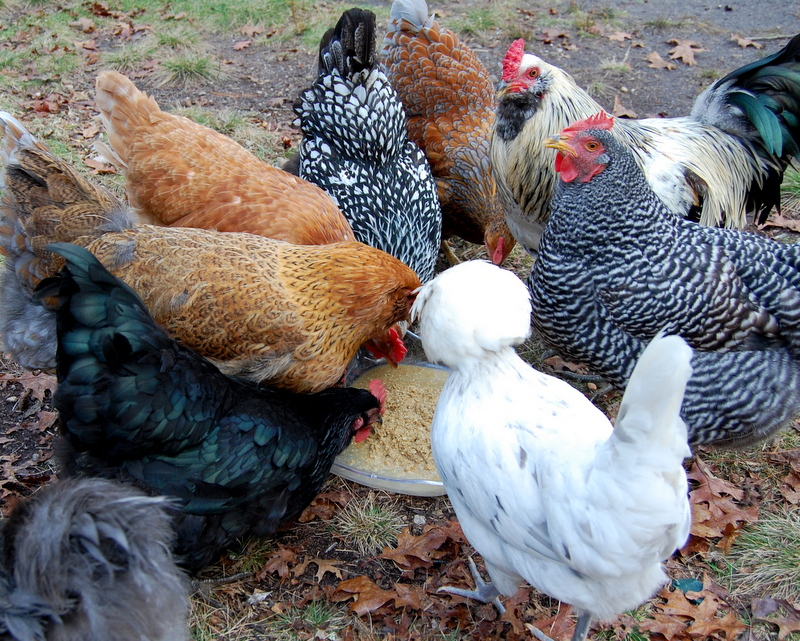
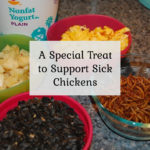

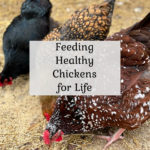
Becky
Sunday 26th of June 2022
What type of feed can you use? Are the pellets ok? Or do you need grains?
Liz
Tuesday 28th of June 2022
I have always used crumbles because it is what my birds are used to, but you can do it with pellets too
Nicole
Wednesday 5th of January 2022
Why microwave? Microwaving literally kills all the benefits of fermenting. I do not recommend microwaving. If you must warm it up, you'd be better off soaking the container in warm, NOT hot, water.
Judy
Wednesday 17th of May 2023
@Nicole, Right. Heating the ferment sterilizes it.
Ahmad dogar
Wednesday 14th of July 2021
Really helpfull to me .if fermented feed smells like vinegar is it bad ?and if its smell like alcohol?
Judy
Wednesday 17th of May 2023
@Ahmad dogar, It fermented long enough that acetobacter or other acid forming bacteria have or are consuming the alcohol from the yeast on the grains and excreting vinegar in place of it. When grain ferments, it forms alcohol, for example whiskey, gin and vodka. The idea is to ferment it a little to exponentially increase the number of good bacteria and yeast and break the grains a little to make them more digestable. This in turn, helps the chickens digestive system turn them into molecular cell components, just like it does for people. =)
This is why we make kefir instead of purchasing it from the store shelving. It is VERY active, FULL of probiotic critters and cannot stand on a refrigerated shelf very long without blowing up. The activity of the ferment has to be dampened or slowed in order to be shelf stable.
Make your own ferment.
It is easy as long as you are using foods that have not had their natural flora/fauna altered by pesticide. You just macerate lightly, add a little water and give it a day or so.
Liz
Wednesday 14th of July 2021
No it should smell slightly sweet and tangy. Vinegar smell would indicate it has gone bad and alcohol smell means you likely let it ferment too long (and shouldn't be fed to chickens)
Elisa Hinojosa
Friday 6th of November 2020
Hello! I am a new chicken mom. Can I used a chicken feed that contains yeast in the ingredients for fermentation? Will they get drunk?
Liz
Monday 9th of November 2020
That is totally fine - no drunk chickens!
Stevie
Saturday 25th of April 2020
How long will the fermented feed last please? Does it need to be stored airtight, or can I just replace the scoop of fermented feed I take out with a scoop of fresh feed?
Liz
Saturday 25th of April 2020
I don’t usually let the feed go beyond a week or so, so I can’t properly answer that question. You could experiment with a small amount. It should smell sweet and a little yeasty. If it smells rotten, it’s gone bad and should not be fed to your animals. It would probably be better to just have a few jars going at once rather than “feeding” the already fermented feed with new feed